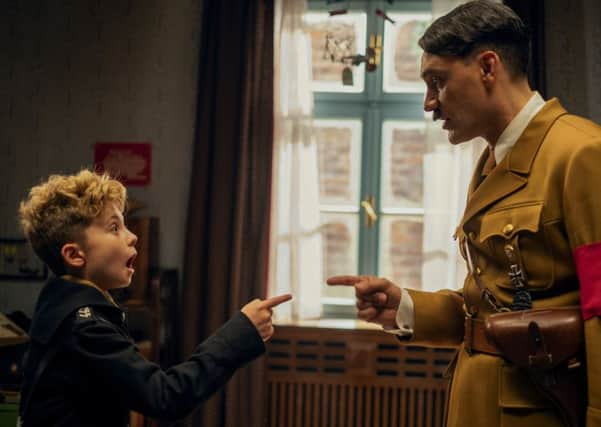Film reviews: JoJo Rabbit | The Gentlemen


Jojo Rabbit (12A) ***
The Gentlemen (15) ***
Revolving around a 10-year-old German boy whose imaginary friend happens to be Hitler, Taika Waititi’s “anti-hate” comedy Jojo Rabbit could have been a Springtime for Hitler-style misfire, but the Thor:Ragnarok director’s ability to ridicule the Third Reich with a coming-of-age comedy mostly works by filtering its horrors through the prism of its eponymous Hitler Youth protagonist (Roman Griffin Davies).
Kicking off with Jojo getting a pep-talk from his fantasy Führer (played with maniacal glee by Waititi, who has Jewish and Māori heritage), the film sets out its stall early with an opening credits sequence that marries archival footage of German children cheering and Sieg Heil-ing Hitler to a soundtrack of The Beatles performing a German language version of I Wanna Hold Your Hand. The link between childhood hysteria and an entire nation losing its mind duly established, the film starts picking apart the anti-Semitic ideology of Nazism by exposing the dangerous idiocy fuelling its guiding principles, with Jojo – injured in a Hitler Youth training camp exercise – gradually learning the error of his ways from the Jewish teenager (Thomasin McKenzie) he discovers hiding in his own mother’s attic.
Advertisement
Hide AdThough the film’s approach is broad and blunt on the surface – Sam Rockwell and Rebel Wilson, for instance, make no bones about playing the most cartoonish Nazis imaginable – there’s subtlety here too. As a perma-grinning SS officer conducting house-to-house searches, Stephen Merchant manages to be funny and frightening and the moment Waititi’s comedic Hitler starts spouting actual hate speech makes a sly point about the petulant irrationality underscoring it.
Indeed, Waititi’s ability to use comedy to illuminate the false framework of such hateful ideology is a valid one and, the odd descent into sentimentality notwithstanding, the film manages to tread a fine line between hilarity and real pathos, the latter coming courtesy Scarlett Johansson’s compassionate turn as Jojo’s mother.
“There’s f***ery afoot,” says a character midway through The Gentlemen and lo, Guy Ritchie’s first mockney crime caper in more than a decade re-establishes him as the less talented British cousin of Quentin Tarantino. Back after a lucrative few years spent as a studio gun-for-hire, he’s come up with an gangster story full of deliberately over-the-top characters all boasting insouciant attitudes to violence, a fetishistic love of English pub culture and the class system, as well as a tendency to use overly euphemistic, syntactically nonsensical street slang.
Matthew McConaughey takes the nominal lead as Mickey Pearson, an Oxford-educated drug lord who’s built an empire in the UK by farming marijuana on the country estates of Britain’s cash-poor landed gentry – saving them from the perils of inheritance tax with commissions from his ever-expanding business and allowing him to “gentrify” his own reputation by basking in the respectability of the nation’s top toffs. But when his determination to cash-out and retire not only sparks a turf war but coincides with a tabloid vendetta against him, his second-in-command (Charlie Hunnam) must contend with various schemes put into play against his organisation.
This all requires a lot of exposition to get through, so Ritchie frames it as a blackmail attempt by a gutter dwelling tabloid investigator (Hugh Grant, doing an unapologetically bad Michael Caine impression). He wants to sell the info he has on Mickey for £20 million and the chance to turn it into a movie – a little meta-flourish that’s not nearly as clever as Ritchie clearly thinks it is. On the plus side, though, Ritchie remains a good visual stylist, so while he’s got a tin ear, he’s got a good eye, something that ensures The Gentlemen is never boring. He also has a fine cast at his disposal, though only Colin Farrell – cast in a supporting role as a boxing trainer – has a clear sense of how to make Ritchie’s caricatures come alive in any memorable way. Consequently he steals every scene he’s in. ■
Jojo Rabbit and The Gentlemen are in cinemas from 1 January 2020